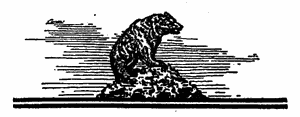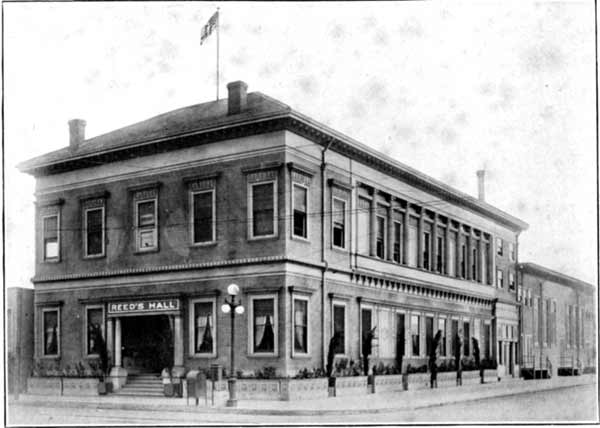| Home -> Other California History Books -> The Spirit of 1906 - The "Dollar for Dollar" Resolution | |||
 |
|||
|
The "Dollar for Dollar" Resolution
|
|||
|
It became my duty to inform the directors that a meeting of the representatives of all the fire insurance companies interested in the conflagration was called for an early date at Reed's Hall, Oakland, and that I understood the principal object of this meeting was to secure an expression of opinion as to the method to be adopted in settling San Francisco losses, whether seventy-five cents on the dollar should be paid or settlement on a 100 per cent basis be made, and I requested instructions. This was merely pro forma as the company had already announced its position publicly as being in favor and promising to pay cent for cent the full obligation of its contracts. The board gave me the instructions I had expected.
The meeting at Reed's Hall was a most memorable one. The late Geo. W. Spencer, at that time manager of the Aetna Insurance Company, presided, and to his fair and impartial rulings and usual courtesy and dignity of manner, is attributable the fact that there was not considerably more friction than developed. Even as it was, the discussions were acrid and verged at times close to personalities and the oratory, especially on the part of those who advocated the "six-bit" policy, was both perfervid and vociferous. However, the representatives of the companies that had made up their minds that their honor and contracts were worth dollar for dollar had little to say and were not influenced by the alleged arguments of the "six-bit-ers." They felt that in the last analysis there was no logical, honest argument for the discounting of payments unless it were a case of absolute insolvency with individual companies. It was maintained by the opponents to the "six-bit" policy that the insuring public had paid for what it assumed to be valid contracts and was entitled to just indemnity and payment in full. Finally, the roll call came to ascertain the sense of the meeting - seventy-five cents or one dollar. The roll call was thrilling in the intensity of feeling it developed and in the position in which it revealed each company's standing, whether for an honorable fulfillment on the one hand or a dishonorable scaling of losses on the other. Alphabetically, the California Insurance Company came early in the list and I voted with those who felt their obligation to be one hundred cents on the dollar. The position which the California would take had been awaited with considerable interest. The public announcement that the company would pay dollar for dollar was still recent and this announcement had appealed to nearly every person at that gathering as a promise which the company was absolutely and physically unable to perform. The registering of the vote called forth quite a demonstration. Laughter, smiles and sarcasm predominated in the part of the hall where I was located. For a moment I was the center of attraction. Despite the embarrassment and annoyance under which I labored, I felt that I was called upon to defend the good name of the company and, gaining recognition from the chairman, I said that the manner in which the "California" voted seemed to cause some of those present considerable amusement and that, individually, I didn't see anything in it that was funny; that it was more of a tragedy than a comedy, and that it was a solemn and serious matter for the company of which I was the representative to go on record for the second time, publicly, as pledging itself to pay so tremendous an amount of money out of the pockets of its stockholders; that I was present at the meeting to carry out the expressed instructions and wishes of these same stockholders and that they intended to be scrupulously careful in keeping their promises, backing their words with their deeds and dollars. This statement brought from the dollar-for-dollar companies a gratifying amount of applause and the "six-bit-ers" sank into silence. As the days passed and the "tumult and shouting" died, it gave a certain amount of satisfaction to find that amongst the jeerers and sneerers at the memorable Reed's Hall meeting, those who had battled most vigorously for the horizontal cut of twenty-five cents were those who afterward developed into the worst welshers and shavers in the entire history of the loss settlements of the San Francisco or any other conflagration. The "sparkling" Rhine, the "still" Moselle, the far-famed "Dutchess," the German of Freeport, the Traders of Chicago, the Austrian Phoenix, the Calumet, the American of Boston and others soon after sought the seclusion which a receiver or cessation of business in California grants, and like the Arab, they folded their tents and silently stole away. At the termination of the meeting, President Chase of the Hartford, President Damon of the Springfield, Chairman Spencer and several others, all leaders in dollar-for-dollar ranks, some of whom are alive and some of whom are gone, gathered around and congratulated the California upon its attitude. Individually, it gave me a feeling of pride and satisfaction to be the representative of a company which manfully stood up to the rack with the best traditions of American fire insurance. It may be well to recall to mind as a historical fact that it was at this meeting the term "dollar-for-dollar" companies was born. |
|||
 |
|||
|
"Reeds Hall," Oakland Calif., where the "Dollar for Dollar" resolution was adopted.
|
|||